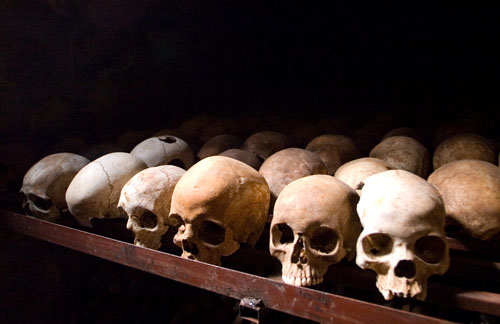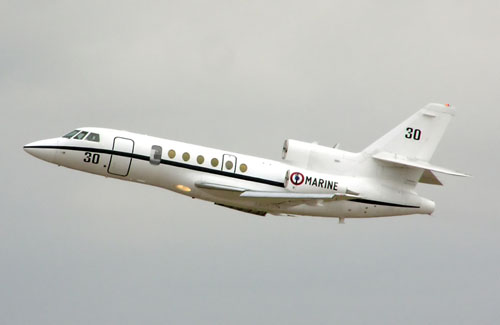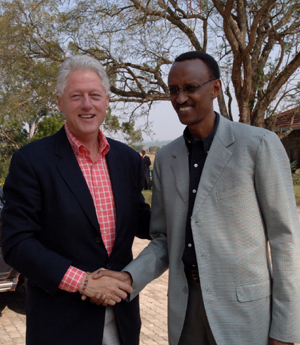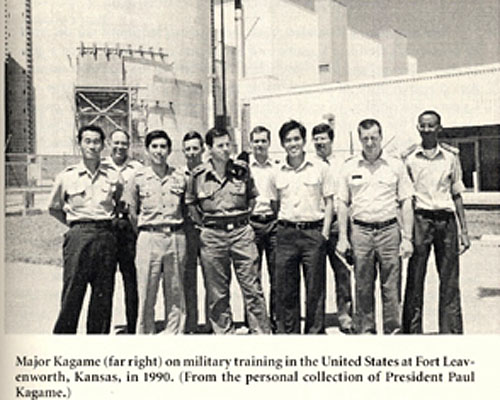
The Nyamata Memorial in Rwanda, pays tribute to the memory of the hundreds of thousands of Rwandans killed during the 1994 genocide.
By Ann Garrison
April 8, 2010
On April 7 the United Nations began its annual commemoration of the anniversary of what we know as the 1994 Rwandan Genocide, in which as many as a million Rwandans may have died.
The ceremonies raise several questions for all those who contest the received history of the Rwanda Genocide: How to honor Rwanda’s dead without honoring the lies?
And, how to honor six million more Congolese dead, but not commemorated, in the ongoing aftermath of the Rwanda Genocide when Rwanda’s war crossed its western border into neighboring D.R. Congo?
Though both tell the received history of the Rwanda Genocide; the BBC and Wikipedia mark its outset not on April 7th, as the UK, UN, and Rwandan officialdom do, but on April 6th, when, in 1994, the assassination of Rwandan President Juvénal Habyarimana and Burundi President Cyprien Ntaryamira triggered the ensuing panic and violence that grew into the horror of the next 100 days and beyond. The two presidents were flying home from a conference between east and central African leaders in Tanzania, held to discuss ways to end violence between ethnic Hutus and Tutsis from Burundi and Rwanda, when their plane was shot out of the sky over Rwanda’s capital, Kigali.
On the evening of April 6, 1994, the BBC reported:
The deaths of the presidents, both Hutus, look likely to make the situation in both states [Rwanda and Burundi] worse. Heavy fighting has already been reported around the presidential palace in Rwanda after news of the deaths spread. News agencies in Kigali said explosions have been rocking the city but it was not immediately clear who was involved in the fighting.

Shortly before 8:20 pm local time (6:20 pm UTC), on April 6, 1994, the Rwandan presidential jet, a Dassault Falcon, circled once around Kigali International Airport before coming in for final approach in clear skies. A surface-to-air missile struck one of the wings, before a second missile hit its tail. The plane erupted into flames in mid-air before crashing into the garden of the presidential palace, exploding on impact, killing both the Rwandan and Burundian presidents. Photo courtesy Wikimeda Commons.
Carla del Ponte, lead prosecutor for the International Criminal Tribunals on Rwanda and Yugoslavia, in her book “Madame Prosecutor; Confrontations with Humanity’s Worst Criminals and the Culture of Impunity,” tells the story of how she was fired by the UN after announcing her intent to prosecute sitting Rwandan President Paul Kagame for the assassination of Presidents Habyarimana and Ntaryamira that triggered the genocide.

Former President Bill Clinton is such a good friend and admirer of Rwandan President Paul Kagame that he presented Kagame with one of his Global Citizenship Awards in a ceremony on September 24, 2009.
The received history says that former President Bill Clinton and the rest of the world stood by and let extremist Hutus murder up to a million Rwandan Tutsis and moderate Hutus until current Rwandan President Paul Kagame and his Rwandan Patriotic Front (RPF) army arrived in Kigali to end the killing, restore order and begin a reconciliation process. Volumes of interviews, testimonies, mass-grave exhumations and identifications as well as statistical analysis by five different teams of investigators, tell a far more complex story that includes a psychosis-induced mass-murder. Five teams of investigators came to varying sets of conclusions which University of Michigan Professor Allan Stam explained in Coming to a New Understanding of the 1994 Rwanda Genocide. Four out of five teams concluded that the vast majority of those who died were Hutus.
French is Dead, Long Live English!
Some say that Clinton could have stopped it with a phone call because the US and UK were backing Kagame’s RPF Tutsi Army, whose advance from the north after the assassinations stirred waves of panic and consequent violence in southern Rwanda.
But, whether he could have stopped it that easily or not, and/or at what point, the Rwanda Genocide ultimately represented the triumph of the US, the UK, and their allies over France in a fierce scramble for Central Africa’s vast natural resources, including the dense mineral wealth in eastern D.R. Congo.
President Paul Kagame, an English speaking Rwandan refugee in Uganda from the age of two, rose to become an officer in Uganda’s Army, then Intelligence Chief, then RPF Commander, after training at Fort Leavenworth, Kansas, where future generals learn to plan invasions.

Paul Kagame, far right, with his comrades at the US Army’s Fort Leavenworth, Kansas, 1990.
The RPF army invaded Rwanda across its northern border with Uganda in 1990 and arrived victorious in Kigali at the end of the 100 days following the Habyarimana and Ntaryamira assassinations.
Though reported to have stood by during the genocide, the US moved in to build a large military base in Rwanda almost as soon as the RPF triumphed, as reported in the New York Times, July 27, 1994:
The United States is preparing to send troops to help establish a large base in Rwanda to bolster the relief effort in the devastated African nation, Administration officials said today.
(Administration officials’ claim that relief was the base’s purpose is disputed by those who dispute the history of the genocide.)

General, and now Rwandan President, Paul Kagame.
All Rwandans share the native African language, Kinyarwanda, “Rwanda” for short, but before the English-speaking RPF victory, urban, educated Rwandans also spoke French, the language of the dominant European power and thus the language in which Rwanda conducted international business.
The new RPF rulers declared English the language of business, causing enormous stress and dislocation to French-speaking Rwandan professionals, and in November 2009, the Commonwealth Heads of Government welcomed Rwanda, a former member of the Commonwealth’s equivalent, La Francophonie, as a member.
Shortly thereafter, “French is dead; long live English in Rwanda!,” a news report from the English stream of French-based satellite channel, celebrated the end of 100 years dominance of the French language and French business ties.
Law Professor Peter Erlinder, former National Lawyer’s Guild President, lead defense counsel for the International Criminal Tribunal on Rwanda, and author of the Rwanda Documents Project, offered these comments on the commemoration of the 1994 Rwanda Genocide:
“Commemorating the ‘Rwandan Genocide’ is certainly a noble goal, but without acknowledging the role of the current Rwandan President Kagame in the assassination of Presidents of Rwanda and Burundi, and the crimes committed by his forces in their 90-day assault to seize power in 1994, whether those crimes are called ‘Genocide’ or ‘Crimes Against Humanity,’ converts a solemn remembrance into a farce of political deception and ‘cover-up, organized by the dominant member of the UN Security Council and Kagame’s most-important backer, the government of the United States.
“Investigating judges in France and Spain have indicted Kagame and his RPF forces. US government and UN documents from 1994 confirm that Kagame’s RPF is guilty of mass-killings during all of 1994, which continue in the eastern Congo to this day. More than 6-million have died as a result of the Kagame-initiated war and violence in Central Africa and the former Chief UN Prosecutor, Carla del Ponte, has concluded that Kagame’s RPF is responsible for crimes that have been charged to the side that lost the Rwandan Civil War between 1990 and 1994.
“In 2009, the four top-military leaders of the vanquished army have been acquitted of planning or conspiring to commit genocide, or any other crimes, in the UN Tribunal.
“Del Ponte has publicly said that she was fired from her UN job by the US in 2003, when she insisted on prosecuting Kagame and the RPF.
“There is much, much more to a ‘genocide remembrance’ than meets the eye even when the UN is involved and history is ignored, or ‘covered-up’ in the interests of superpower geopolitical interests.”
Never again?
This admonition from the web pages of the UN’s 2010 Rwanda Genocide commemoration could not more perfectly describe Rwanda as it is now, under Rwandan President Paul Kagame and his ruling RPF Party:
Warning Signs of Genocide
The Special Adviser on the Prevention of Genocide, working with other genocide experts, has compiled a list of warning signs that could indicate that a community is at risk for genocide or similar atrocities. It includes:
• the country has a totalitarian or authoritarian government where only one group controls power
• the country is at war or there is a lawless environment in which massacres can take place without being quickly noticed or easily documented
The UN is at least good for comic relief, but pretending that these were warning signs of Rwanda’s past, and not its present, does not honor the dead. It honors the lies told by the US, the UK, and the UN to cover their responsibility for the loss of millions of African lives.
Senator Russ Feingold calls for political space in Rwanda
On March 2nd, as grenades exploded in Kigali, and Kagame’s political targets fled the country, Senator Russ Feingold, Chair of the Senate Subcommittee on Africa, read the Feingold Statement on the Fragility of Democracy in Africa, into the Congressional Record, calling on President Barack Obama to make human and political rights a condition for the support of the US and other “donor nations” in Africa.
Feingold stressed the urgency of the Rwandan political situation, with presidential election polls approaching in August.
The Africa Faith and Justice Network, Human Rights Watch, Amnesty International, Friends of the Congo, the Commonwealth Human Rights Initiative Group, Reporters without Borders, the Committee to Protect Journalists and the Greens/European Free Alliance, have also called for a free and fair election in Rwanda and an end to civil and human rights abuses.
This is advocacy within a very narrow, very contradictory political space, that of Western parliamentary democracy within the larger context of an unsustainable Western scramble for Africa’s energy and mineral resources, driven by the West’s unsustainable, growth-driven culture and economy.
Ann Garrison is an independent journalist and contributor to the San Francisco Bay View, Global Research, Digital Journal, KPFA and KMEC Radio News, and her own blog, Plutocracy Now: the War and Plunder Report. More of her radio/video reports available on YouTube.
More Info
KPFA News report 4/4/10: Peter Erlinder and Paul Rusesabagina discuss the 16th anniversary of political assassinations that triggered the Rwanda Genocide


 The Hunger Site
The Hunger Site
April 14, 2010 at 2:08 pm
Re French/English in Rwanda: here’s a great cartoon from Umuseso, an independent Kinyarwanda tabloid that the government just shut down, http://kigaliwire.com/wp-content/uploads/2010/04/Umuseso-commonwealth-cartoon.jpg
April 12, 2010 at 11:54 pm
Thanks, Kidume. The UK has at least finally provided some comic relief amidst Rwanda’s increasingly tense political environment by inviting Members of Parliament, including Rwandan MPS to the UK to observe elections next month, http://goo.gl/JnzE HA HA HA HA!!! HA!!! Thank you, Tony Blair, no doubt, for that.
I just urged one of my Rwandan friends, an exile and activist n London, not to waste any well reasoned argument on this, though I might try to summon my own comic muse and encourage Rwandans to do the same.
Tony Blair, special advisor to Paul Kagame, joined Kagame and California’s own Reverend Rick Warren for a national prayer breakfast in Kigali last year.
April 12, 2010 at 2:34 pm
Thanks Fog City Journal for this article. When Hillary Clinton qualified Kagame and his government as a beacon of hope and when her husband was giving an award to Kagame, I was thinking that most American can only see Rwanda and its history through lazy journalists’ headlines. In other words, i never expected this kind of thoroughly and well researched article from here.
We do appreciate that at least someone tells the truth about Rwandans, Burundians and Congolese silent long suffering that has been going on for three decades now.
Our countries are far away from headlights of the media, but the blood-stained mineral resources, for which millions of ordinary people have lost their lives, end up in every american and british household. That is why it matters much that the whole world should know about the price paid for the western technological satisfaction.
Kidume
April 10, 2010 at 12:51 pm
The Fog City Journal and Ann Garrison, thank you so much for this article, which contributes to making the truth known about what happened in Rwanda and the Democratic Republic of Congo.
Robert McNamara, the former US Secretary of Defence once described a conversation he had with General LeMay of the United States Air Force. McNamara said ” LeMay said, “If we’d lost the war, we’d all have been prosecuted as war criminals.” And I think he’s right. He, and I’d say I, were behaving as war criminals. LeMay recognized that what he was doing would be thought immoral if his side had lost. But what makes it immoral if you lose and not immoral if you win?”
This is exactly what happened in the Rwandan situation. The RPF committed so many war crimes and crimes against humanity before the genocide, during the genocide, and after the genocide. As one of the millions of the victims of these RPF crimes, it saddens me every single time I see so many other avenues where they praise the RPF and General Kagame and totally ignore how many millions of lives the RPF has shattered.
Thank you so much for having the courage to speak up for the truth when so many others find it easier to echo the false pro-RPF narrative! The truth is the only way to say “Never Again” and actually mean it. There cannot be a “Never Again” when the truth is stifled. Thank you for daring to tell the truth!
April 9, 2010 at 12:07 pm
I should have added that Nancy Pelosi lights her candle only for Rwandans, not for six million war dead in the aftermath in D.R. Congo.
And, she seems to have been poorly briefed to say “more than 100,000 people” in Rwanda.
April 9, 2010 at 11:52 am
Exact, Snyiranzayire. Genocide is a means to an end in Central Africa: natural resources.
I hope that San Franciscans, the majority of Fog City Journal readers, are reading this as well, although my guess is that, if they are, the subject is so unfamiliar that they don’t have an opinion and therefore aren’t commenting, though the San Francisco Bay Area uses far more of Rwanda and Congo’s resources than Rwandan and Congolese people do. That’s a no-brainer if one simply considers the defense and electronics industries, apart from all the other food and mineral manufacturing inputs, gold and diamonds, electricity, and Starbuck’s coffee (grown in Rwanda). I could say the same about the City of San Francisco, less than a million people, as well, though I’ll have to sit down and play with #s to support that.
And here’s San Francisco’s Congressional Rep Nancy Pelosi lighting a candle and saying “Never again,” on April 7th, 2009, with the US/UK/UN/Kagame/RPF, not on April 6th, the day that President Habyarimana’s plane was shot down, http://www.youtube.com/watch?v=RT_4CpAvEUI
April 9, 2010 at 1:38 am
This article highlight the hidden truths about the Rwandan Genocide.
Kagame is not a hero as most people are forced to believe. He is not the innocent victim but rather the trigger that sparked genocide. He is using genocide as goodwill to make more money and oppress the Rwandan people.
The problem is Rwanda is deep rooted in the conquest of the natural resources in Central Africa. Genocide is a means to an end.
This does not mean in anyway that what happened is not serious. On the other hand it just show that the people who should be brought to book are the judges.
Ultimately, the deaths of millions of people in Rwanda or in Congo does not help any country. The UK and the US might have established English as the main language of Rwanda and maintained a dictatorial leader in Rwanda convicted of crimes against humanity, but the price is so high the the consequences difficult to fanthom.
The UN that was controlling Kigali during the genocide period, the US and the UK that were bombing Rwanda to install Kagame as a President should take responsibilities for what happened. Every Rwandan know what happened, but the way forward is to build a new Rwanda and reconstruct not only roads and buildings, but lives destroyed.
April 8, 2010 at 8:46 pm
Huge thanks to the Fog City Journal for finally publishing the truth about the Rwandan tragedy. Indeed, a majority of us Rwandans know that as long as the terrorist who killed President Habyarimana and President Ntaryamira has not been convicted in an international court of law, there is a danger that the cycle of violence will continue in our country.
For the sake of the 800,000 to 1 million innocent civilians who were butchered in Rwanda during the genocide, the truth needs to come out. Who made that decision to shoot down the Falcon 50 plane and did this person know at the time that they were risking the lives of hundreds of thousands of innocent civilians? Is it the current Rwandan president General Kagame as the judges in Spain and France said?
The current Rwandan government talks so much about honoring the victims of the genocide. Yet, General Kagame’s government continues to block any attempts for the United Nations to find out who the culprit was. It is time for his government to do more than talking. It is time for the Rwandan government to ask for a United Nations investigation into this terrorist act. The truth about who actually ordered the shooting down of that presidential plane is a better way to honor the genocide victims, better than all the talk by the government.
April 8, 2010 at 3:49 pm
Re Hotel Rwanda: The movie was based on Paul Rusesabagina’s autobiography, “An Ordinary Man.” If you listen to the KPFA News with Peter Erlinder and Paul Rusesabagina, you’ll hear him confirm that he now lives in San Antonio where he is heavily bodyguarded all the time because sitting President Paul Kagame’s agents have already tried to assassinate him, and, twice ransacked his house and stole all his papers in Brussels. He was sitting in a plane, about to take off to Brussels, the home of many French-speaking Rwandan refugees when I recorded him for KPFA. President Kagame accuses both Paul Rusesabagina and Victoire Ingabiré Umuhoza, the FDU-Inkingi Party’s presidential candidate, of “Double Genocide Theory,” because they dare to say that Hutus were also victims of crimes against humanity.. http://goo.gl/ne3K
April 8, 2010 at 12:36 pm
In 2004, my wife and I visited Rwanda, primarily to visit the mountain gorillas in Volcanoe National Park. We did see two gorilla families, each of which had a newborn. Fantastic experience. Our Rwandan guide recommended a visit to the Kigali Memorial Centre (the Genocide Museum), a sobering experience. The Museum is set up much like the Holocaust Museum in Jerusalem. A series of panels set forth the events leading up to the Genocide, the Genocide, and its aftermath. There is video footage of Rwandans being murdered, oral testimony of witnesses, and piles of victims’ skulls and bones. Outside the museum, a number of concrete vaults hold the bodies of the genocide victims. As bodies are recovered, they are placed in caskets. When a vault is full of caskets, a concrete cover is lowered over the vault and sealed. It is estimated that over 1 million Rwandans were murdered over a 100-day period in 1994. The banner over the entrance to the Museum states, “Never Again.” After, Darfur/Sudan, it probably should say, “Almost Never Again.”
General Romeo Dallaire, the Canadian general in charge of the UN forces during the genocide, wrote about his experiences before, during, and after the Genocide in “Shaking Hands With the Devil.” The book was recommended to us by our Rwandan guide. We highly recommend the book. We also recommend Peter Raymont’s documentary, “Shake Hands With the Devil: The Journey of Romeo Dallaire,” which won the World Cinema Documentary Award at Sundance. Other books we recommend are: “We Wish To Inform You That Tomorrow We Will Be Killed With Our Families: Stories From Rwanda” by Philip Gourevitch, and “A Sunday At the Pool in Kigali” by Gil Courtemanche. Finally, we rcommend the movies “Sometimes in April” (HBO); “Hotel Rwanda”; and “Beyond the Gates.” There also was a powerful short story, “My Parents’ Bedroom” by Uwen Akpan, in the 6/12/06 issue of The New Yorker.